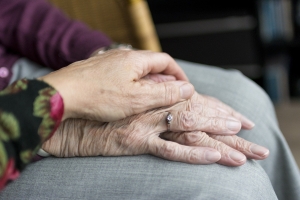Supportive Oncology Care
Often, cancer, and cancer treatment, can cause unwanted symptoms or side effects; our Supportive Care team helps minimize these symptoms and side effects.
Regardless of your diagnosis, Supportive Care plays an important role in the care you receive at HOA.
With physician champion Silviu Pasniciuc, M.D., our specialized team provides individualized care and support, depending on your needs.
We’re here for you!
If you have not yet met with our supportive care specialists, ask your doctor about it today.
Call us at 315-472-7504
You and your doctor will use a “shared decision making” approach to develop a care plan that is right for you.
What is Supportive Care?
Supportive Care is an essential part of your treatment plan. It provides extra layers of support and aims to help improve or maintain your quality of life.
Involving supportive care in the early stage of your illness often has a positive impact on you and your loved ones.
Supportive care addresses all areas that may be affected by your illness and/or treatment such as:
|
Pain |
Nutrition |
Sleep |
|
Constipation/Diarrhea |
Emotional Support |
Work/Life Balance |
|
Communication with Family |
Advance Directives |
Prioritizing Your Day |
How Does Supportive Care Work?
Supportive care can be provided before, during and after treatment, and aims to promote your best quality of life and minimize unwanted symptoms or side effects.
It is individualized to your needs and helps empower you and encourages you to take an active role in your care. 
In addition to providing specialized symptom management, supportive care also:
- focuses on emotional support and coping,
- offers resources for spiritual support,
- helps address practical needs or concerns,
- and even provides support for caregivers.
Our team works alongside your other doctors to ensure
- your needs are being met
- and your care is well coordinated.
Supportive care encompasses various specialists, ranging from physicians and nurse practitioners/ physician assistants, to registered nurses, physical therapists, social workers, registered dieticians, and more.
- You may see one, or all, of these specialists to provide you with the best supportive care possible.
How Does Supportive Care Help You?
-
Delivers expert treatment of pain and other symptoms, including, but not limited to:
- shortness of breath
- fatigue
- appetite changes
- difficulty sleeping
- depression & anxiety
- Facilitates open discussions about treatment choices and symptom management
- Supportive care empowers you to be involved in decision making and helps ensure that your care is aligned with your values & goals.
- Assists with coordinating care with your other healthcare providers
- Provides emotional support and helps address practical concerns that you may have
What Matters to YOU?
Your values, beliefs and goals are important when considering which treatment option is best for you. You will partner with your doctor & care team to develop a care plan that is right for you.
Tips for Taking an Active Role in Your Care
- It is important to have honest conversations with your doctor & care team.
- Ask questions about your diagnosis, treatment options, goals of treatment, etc.
- Be open and share your opinion & preferences when talking with your doctor.
- Let your team know if you would like some time to think about things.
More About Supportive Care: Did You Know?
- Palliative Care is a type of supportive care that provides comprehensive support aimed at promoting comfort and quality of life, throughout the entire spectrum of an illness.
- The American Society of Clinical Oncology recommends all patients with advanced cancer receive supportive care.
- Supportive care is appropriate at any age and any stage of a serious illness, and it can be provided alongside curative treatment, such as chemotherapy or radiation therapy.
- Supportive care specialists can help with advance care planning. New York State recommends everyone over age 18 have a healthcare proxy.
- Most insurance plans, including Medicare, cover all or part of supportive care services. Our patient advocates are happy to assist you with any questions!
- Supportive care, and palliative care, are not the same as Hospice. While palliative care aims to promote comfort & quality of life along the entire spectrum of one’s illness, Hospice provides comfort care specifically toward the end-of-life. Anyone facing a serious illness, such as cancer, benefits from palliative care.
